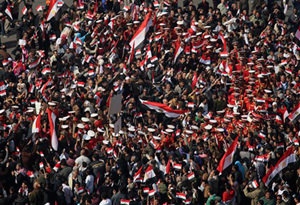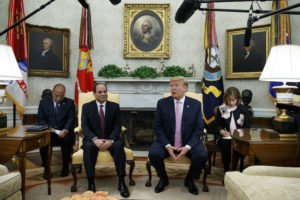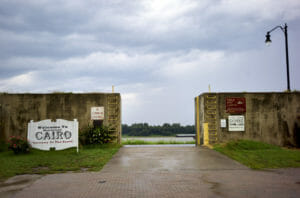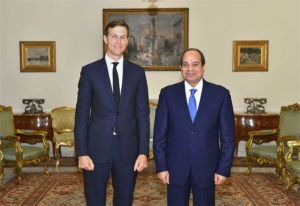Dispatches From Cairo: Victory Celebration
It looked like the most gigantic football victory crowd, with children on their parents' shoulders, Egyptian colors -- black, red, white stripes -- painted on faces, Egyptian flags being waved. Hope and prayers and pride for the New Egypt.
Editor’s note: We have asked Lauren Unger-Geoffroy, an Arabic-speaking American who lives in Cairo, to share her perspective of life in Egypt after the revolution.Friday, Feb. 18
Wow, even MORE people than during the protests were in Tahrir Square today … and today we did not have our previous little area of creative people — all were mixed into the dense potage. There was a military band, the soldiers handed out Egyptian flags, I held tightly to the belts of two of my friends … but felt no tension, only for the most part a sense of nationalistic, festive, if somewhat unfocused joy, of being part of this huge and successful organism. This feeling of pleasure in being united in cause and emotion and connected, physically to millions — it is an experience I personally never would have imagined and am so grateful to live this … but as for the other revolutions following in domino fashion: hopeful imitators. I do believe this exact phenomenon may be uniquely possible in Egypt — or in another alcohol-free, deeply kind, familial, sentimentalist, good-hearted culture with a population of over 80 million habituated to being in a peaceful crush (and with the cherished, shared spiritual experience of massing at pilgrimage to Mecca).
It looked like the most gigantic football victory crowd, with children on their parents’ shoulders, Egyptian colors — black, red, white stripes — painted on faces, Egyptian flags being waved. The military band snaked through the cheering crowd, choruses of the national anthem and other songs, sporadic cheers and chants of “The people and the military are one!” “Egypt! Victory!” “Horrayya! Freedom Finally!” And flags and flags and flags. People hugging soldiers. The army checkpoints to get in were friendly, efficient and reassuring.
There were few people I saw trying to put forth matters of new organization and rational pragmatic planning, though there were signs saying “Free the political prisoners and those arrested in the revolution.” There were signs saying “No more corruption,” a few saying “Bring promised reforms now,” “Military is transition only!” “Goodbye Mubarak,” “God bless our martyrs of the revolution” … so it is safe to say that the people are not going back to passive acceptance immediately.
The prayer was, as always, incredibly impressive and moving — the coordinated movements of tens of thousands, in the unison ritual bowing of the prayer in the direction of Qabbah, the women praying separately but adjacently, the non-praying crowd respecting. Yusuf al-Qaradawi, a famous and popular religious scholar, led the prayer, and though he is a figurehead of the Muslim Brotherhood he praised the nonsectarianism of the movement, and the Coptic Christians who stood guard over the Muslim prayers — and he urged the people to hold strong, read from the Quran about tyrants. The silent concentration of the prayer calmed my heart, but his words and the people’s faces brought tears to my eyes. The biggest crowd yet, happy, but also somehow confused, somehow subdued … and dazed … between rallies of optimism and congratulation.
Although I am now becoming used to being in a massive crowd of millions pressed amicably together, and today was proud and celebratory, there was another subtle tone for me and my friends … and for most. Our bodies squeezed closely against our smiling brothers and sisters cheering our victory and our newly discovered superpowers as a behemoth common entity, in front of a huge poster with faces of the martyrs, three of us looked at each other and were thinking about our friend Ziad Bakir, a graphic designer for the Opera House, who has been missing for two weeks — don’t forget him. He was last seen demonstrating in Tahrir Square, I think it was Feb. 2 during that awful, violent period; friends had the habit of calling each other — everyone — a few times every day, to see if they were all right, and where they were. Ziad has been unreachable since then, and no one has heard from him since. We have been looking and inquiring everywhere, searching among the unnamed dead. (I didn’t personally do this, but his family has). It is a shadow and a weight upon the elation.
And there are still many others who are not yet found. Thousands are searching for our missing brothers.
Yes, some of these sentimental and emotional people are fearful and sad, mourning the loss of the paternal protection of Mubarak that had been a constant of their lives for so long. We heard they would be there, but I did not see them. In fact some of my friends feel this way. In fact many regret that his departure was in disgrace and they still harbor deep-rooted vestiges of filial devotion even though they are proud of the people’s victory.
Hope and prayers and pride for the New Egypt. Yes, there has been progress, arrests of some the biggest corrupt exploiters of the people. No, we do not have a constitution now, or visible government … or word of our missing friends.
I had hoped to see others with whom we had passed the intense days of the revolution, but it was impossible to reach the area where we had camped. I particularly wanted to find 10-year-old Ahmed, who had become our mascot and whose previous dreamless future had been transformed — I will talk more about him later, and I will catch up with him soon, Insha’Allah.
There is still so much to do, so much unclear, and so much to struggle for and create. The political and creative primordial broth boiling with potential, bursting forth in peaks of brilliant ideas and some of the finest music, art, graphic art, poetry, video, editing and writing and political innovation proposals. [Political] possibilities that could look good for now, but most in the long run would be an error.
It is clear that though 93 percent of the population are Muslim and strong and comforted in their faith, most still do not want a theocratic political system that would enforce Shariah law outside of the religion. This is a separate thing and should remain so … it is between the people and their God, it is not a rule by men. There are many new parties bubbling up. There is a significant following and some controversy about the new January 25th Party — attempts to discredit, maybe contrived by opposition. We will see. I will give you more info on them later.But now …
I am back in Maadi. Leaving Tahrir was slow through the millions, now looking somehow glazed behind their cheers, and more pouring in, victory-honking traffic from all of Egypt it seems, coming the other way, cheering and wanting to taste the victory massing. My friend Jehan was feeling unwell and Amr has a TV show to air tonight, so we left. Amr says he might want to return later if he finishes early, as the festivities will surely last all night despite the midnight curfew; we shall see. I will let you know later if I do [stay through the night].
Now I’m at my old place, my old roommates have gone to Alexandria and I am still moving out some stuff. There is some victory-celebration overflow in the square below — honking and chanting and still a tank there protecting. There are some shots outside — I don’t know what it is, it is coming from the square, I hope it is just the soldiers firing in the air as a reminder that they are keeping order. I will go out and check in a moment.
Talk to you later, my friends. Victory. Liberation. It’s not over yet.
Peace be with you.
Your support matters…Independent journalism is under threat and overshadowed by heavily funded mainstream media.
You can help level the playing field. Become a member.
Your tax-deductible contribution keeps us digging beneath the headlines to give you thought-provoking, investigative reporting and analysis that unearths what's really happening- without compromise.
Give today to support our courageous, independent journalists.



You need to be a supporter to comment.
There are currently no responses to this article.
Be the first to respond.